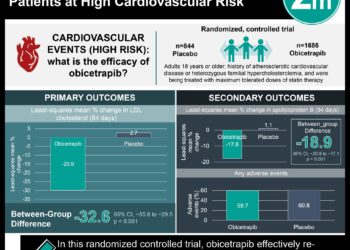Genetic variants related to serum calcium levels associated with coronary artery disease
1. This Mendelian randomized study found that a genetic predisposition to higher serum calcium levels was associated with an increased risk of coronary artery disease and myocardial infarction.
2. There was no evidence of pleiotropy or heterogeneity between the Mendelian randomization estimates from different single nucleotide polymorphisms in this study.
Evidence Rating Level: 2 (Good)
Study Rundown: Calcium is important in various biological functions in the body, such as nerve transmission, hemostasis, blood pressure regulation, hormone regulation, and muscle contraction. There have been observational studies suggesting that elevated serum calcium levels are associated with an increased risk of cardiovascular disease. Additionally, several clinical trials have suggested that calcium supplementation—which elevates serum calcium—may increase the risk of myocardial infarction. It is still unclear whether lifelong elevated serum calcium is associated with coronary artery disease (CAD) risk. This study looked at genetic variants that have a specific influence on serum calcium levels, as a proxy to study the association of lifelong elevated serum calcium and CAD risk. The Mendelian randomization study found that genetically elevated serum calcium levels were associated with increased odds of coronary artery disease and myocardial infarction.
The results of this study support several previous observational findings that linked elevated serum calcium levels with an increased risk of cardiovascular disease. However, the study had some limitations. First, some genetic variants provided more weight and provided a stronger relation between the single nucleotide polymorphism (SNP) and serum calcium than others (i.e. the CASR gene was a variant with a strong relation). Second, there was some overlap between the different types of analyses conducted, which could contribute to over-fitting of the SNP-calcium associations estimated in these analyses. Finally, the study lacked complete information on sex and age, and a potential non-linear association between serum calcium levels and CAD could not be evaluated. Further studies are needed to clarify whether increased short- and medium-term calcium supplementation might also contribute to an increased risk of cardiovascular disease.
Click to read the study, published in JAMA
Relevant Reading: Association between serum calcium concentration and risk of incident and fatal cardiovascular disease in the prospective AMORIS study.
In-Depth [randomized study]: This Mendelian randomization study analyzed public, de-identified data from large-scale genome-wide association studies (GWAS). GWAS identified 7 SNP’s associated with increased serum calcium levels and included a total of 61 079 individuals. These SNP’s were evaluated for potential confounders, including major lipids, glycemic traits, type 2 diabetes, BMI. As a result, 1 SNP was found to violate Mendelian randomization assumptions and was removed from the study. The remaining 6 SNP’s were used to extract pre-specified primary outcomes of CAD and myocardial infarction and were used to determine associations of each SNP with rates of CAD and myocardial infarction. Odds ratios of CAD and myocardial infarction were scaled per 0.5 mg/dL increase (roughly 1 SD) in serum calcium levels).
The analysis included 60 801 CAD cases (roughly 70% myocardial infarction) and 123 504 non-cases from 48 cohort and case-control studies. The majority of participants were of European (77%), South Asian (13%), and East Asian (6%) ancestry. None of the individual 6 SNPs were associated with CAD at Bonferroni corrected significance levels (p < 0.008). The odds ratio of CAD per 0.5 mg/dL increase in genetically predicted serum calcium was 1.25 (95%CI 1.08-1.45; p = 0.003). In a sensitivity analyses removing the CASR gene, which was a highly weighted SNP, the OR of CAD was 1.25 (95%CI 0.97-1.62). An analysis of patients with only myocardial infarction yielded similar results (OR 1.24; 95%CI 1.05-1.46; p = 0.009). Complementary analyses such as the weighted median method yielded similar results, and there was no evidence of pleiotropy (MR-Egger intercept, -0.00035; p = 0.96) or heterogeneity between the Mendelian randomization estimates from different SNP’s (I2 = 0%, p = 0.78 for heterogeneity).
Image: CC/Wiki
©2017 2 Minute Medicine, Inc. All rights reserved. No works may be reproduced without expressed written consent from 2 Minute Medicine, Inc. Inquire about licensing here. No article should be construed as medical advice and is not intended as such by the authors or by 2 Minute Medicine, Inc.









